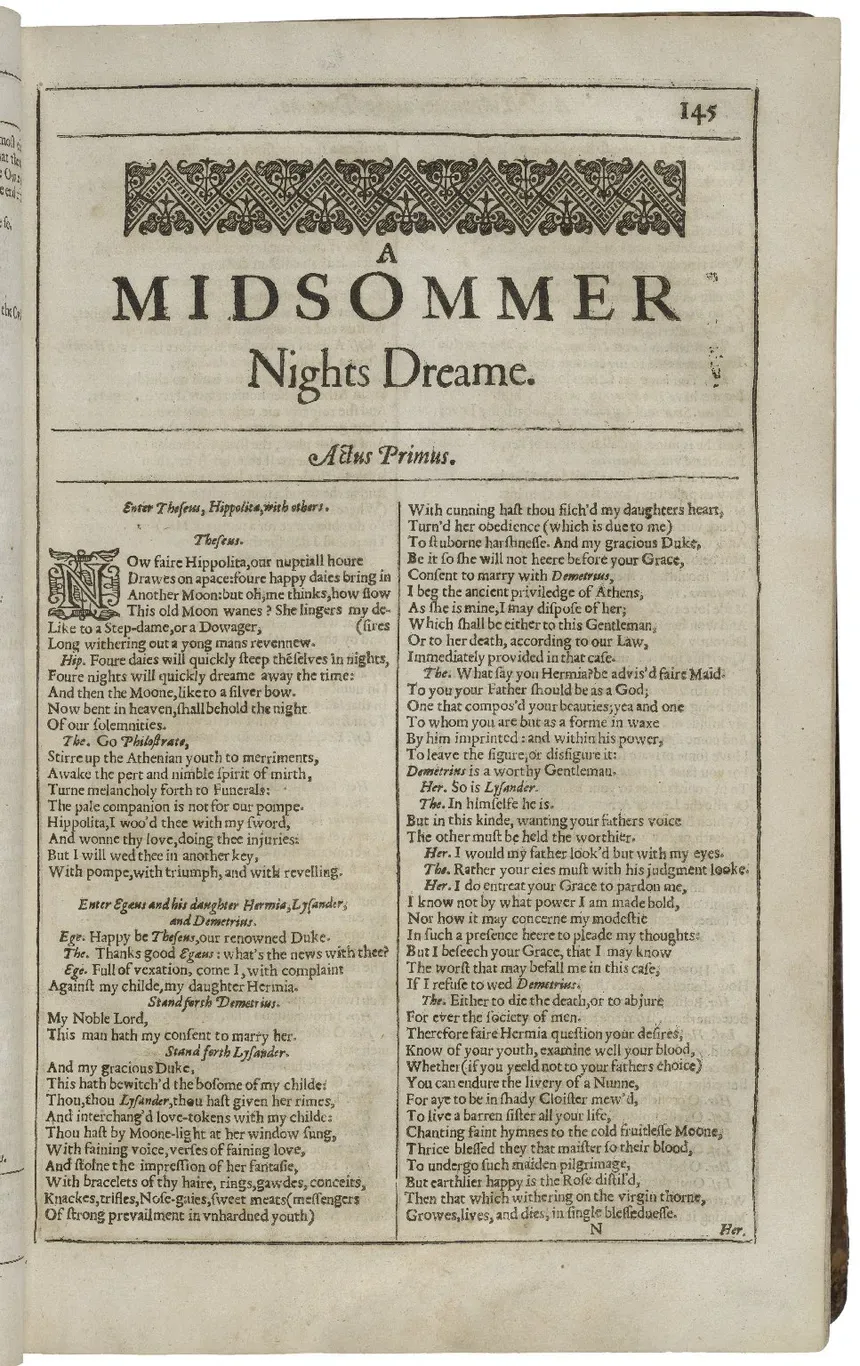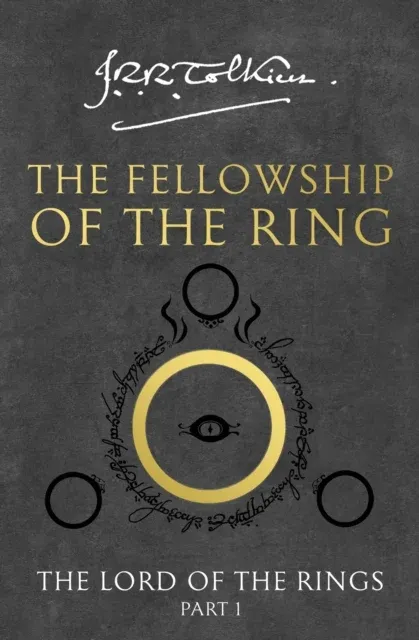A Midsummer Night's Dream

A Midsummer Night's Dream is a comedy play written by William Shakespeare sometime in the sixteenth century.
The play starts with Theseus, the king of Athens, who vanquished the Amazons in battle and fell in love with their queen, Hippolyta. He can barely wait for their wedding day, which is in four days from the beginning of the play.
A ruckus ensues while he is in the garden with Hippolyta, and Egeus, a wealthy citizen of the city, appears with his daughter Hermia, and two men from the city, Lysander and Demetrius. Hermia is in love with Lysander, but her father likes Demetrius better, and he wants Hermia to marry him. If Hermia would not listen to her father, she would either be executed or forced into a nunnery.
After Demetrius and Egeus leave, Lysander tells Hermia about his plan to marry her. That night, they would meet in a forest and elope to his aunt's home, where they would be able to get married. Hermia agrees with the plan, and then they tell Hermia's friend, Helena, about it. Helena loves Demetrius and is now ignored by him because he loves Hermia. She decides to tell Demetrius about Hermia and Lysander's plan to gain his favor.
The moon is mentioned many times in the first scene, even though it is day. This is a foreshadowing of the events that are going to happen during the night, like Lysander and Hermia's escapade. Some examples of moon imagery in this play are:
four happy days bring in
Another moon; but oh, methinks, how slow
This old moon wanes!
This quote, from Theseus, shows us how eager he is for his marriage, which will happen when the new moon rises.
And then the moon, like to a silver bow
New bent in heaven, shall behold the night
Of our solemnities.
This quote, from Hippolyta, says how the moon is like a silver bow. Since the characters are ancient Athenians, this might be a reference to Cupid – they believed that his shooting people with his bow made them fall in love.
Thou hast by moonlight at her window sung,
With feigning voice, verses of feigning love;
This quote, from Egeus, tells us that he thought Lysander's love was "feigning", or giving the false impression of love, and he did it by moonlight to escape the scrutinizing eye of Egeus.
Take time to pause; and by the next new moon
...
Upon that day either prepare to die
For disobedience to your father’s will,
Or else to wed Demetrius, as he would,
Or on Diana’s altar to protest
For aye austerity and single life.
This quote, from Theseus, informs Hermia that she must make her choice by the new moon. For Theseus, the coming of the new moon is a thing that he can barely wait for, but for Hermia, it is a source of dread.
In conclusion, the moon is a spectator or witness to all the events happening in the play, happy and sad alike.
The next scene of the play happens at night. The fairy king, named Oberon, is having a quarrel with his wife, Titania, who adopted an Indian boy that the king wants to use as his henchman. However, Titania doesn't let him take the boy. Oberon sends Puck, his jester, to get a love flower, called "Love-in-idleness". Oberon plans to use it to make Titania fall in love with an animal so that he can convince her to give him the boy in exchange for his releasing her from the spell.
Puck leaves, and Oberon sees Helena and Demetrius in the forest, looking for Hermia and Lysander. Helena tells Demetrius how much she loves him, but he doesn't care. Demetrius runs off into the forest to get away from Helena, and she follows him. When Puck comes back, Oberon, having pity on Helena, tells him to go look for Demetrius and make him fall in love with her.
After Titania falls asleep, Oberon finds her and applies the love potion. At the same time, Hermia and Lysander go to sleep in a meadow. Puck appears and sees Lysander. He uses the love flower on Lysander, thinking that he is the Athenian Oberon spoke about (Demetrius), who is woken up shortly afterward by Helena, who found him after Demetrius left her. He falls in love with her because of the potion. She thinks he is mocking her because she thought Lysander loved Hermia. The comedy in this part is Puck's mistake in identifying who he was supposed to give the love potion to and applying the potion to the wrong person.
Bottom and his crew of actors came into the meadow in which Hermia and Lysander were sleeping. There, they rehearsed their play, and decided to write a prologue telling the audience that the lion and the main character stabbing himself were not real. Puck, after watching them rehearse, turn's Bottom's head into that of a donkey because of the abysmal performance. Titania wakes up because of the braying noises and immediately falls in love with Bottom. This whole scene is funny, from how the actors are described performing the play and their grammatical mistakes, to Puck turning Bottom's head into that of a donkey, to Titania falling in love with donkey-Bottom.
Later, Puck meets Oberon, who is satisfied with Titania falling in love with Bottom. Demetrius and Helena appear, and Puck realizes that he gave the love potion to the wrong Athenian. After Demetrius falls asleep, Puck gives him the potion, and when Demetrius wakes up, he immediately falls in love with Helena. Lysander and Hermia appear, and Helena thinks they are all mocking her. Oberon tells Puck to resolve the problem and goes off to get the Indian boy from Titania. Puck creates a fog to separate Demetrius and Lysander so they don't kill each other, makes them fall asleep, and removes the effect of the love potion from Lysander. There is a lot of conflict in this act that had the potential to end in tragedy – between Hermia and Demetrius (she believes Demetrius killed Lysander), between Helena and everyone else, Demetrius and Lysander, and Helena and Hermia. The only one who has fun in this act is Puck, who enjoys the conflict he brought about.
After getting the Indian boy from Titania, Oberon decides to release her from the spell because he feels sorry for her falling in love with a donkey, and he achieved his desire. He does so and takes off Bottom's donkey head, putting him into a deep sleep so he will wake up the next day and think the events of the previous night were a dream. Theseus' hunting party arrives in the forest and finds Lysander, Demetrius, Helena, and Hermia asleep. Demetrius tells Egeus that he no longer loves Hermia but wants to marry Helena, and Theseus commands them to come with him back to Athens so that they can all get married. Bottom wakes up the next day and finds out that Theseus chose his troupe to perform the play for the wedding. He tells them, and they get ready to go to Athens. Some sources of comedy in this act are how Bottom orders Titania's fairy maids around and Bottom telling his actors to "eat no onions nor garlick, for we are to utter sweet breath; and I do not doubt but to hear them say it is a sweet comedy[sic]".
After the couples get married, Bottom and his crew perform "A tedious brief scene of young Pyramus / And his love Thisbe; very tragical mirth.[sic]" During the play, Pyramus finds his love Thisbe's mantle, which was mauled by a lion and kills himself, thinking she was killed. Thisbe finds his dead body and kills herself too. This play-in-a-play sounds a lot like a parody of Romeo and Juliet, another one of Shakespeare's plays, which might have been published earlier than A Midsummer Night's Dream. After the play ends and everyone goes to bed, the fairies come out of the forest to dance and bless the weddings. Puck makes a final speech to Shakespeare's audience, apologizing for the poor quality of the Pyramus and Thisbe play and promising the next performance would be better. Some sources of comedy in this act were the various grammar errors and contradictions in the Pyramus and Thisbe play, the comments that the spectators make on it, and how Bottom tries to explain certain parts of the play to Theseus and the rest of the audience.




